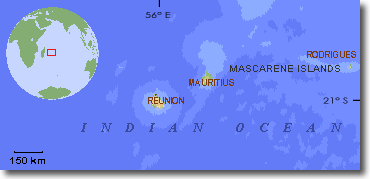


|

|
|
|
IKBS launch page |
|
Background of the project | |
|
|
Current state of the project |
|
Telesystematics | |
|
|
Illustrations of the Pocilloporidae model |
The Mascarene Archipelago composed of the volcanic islands of Reunion, Mauritius and Rodrigues rises from the western Indian Ocean slightly more than 800 km east of Madagascar, between 21°7' and 19°40' south, and between 55°13' and 61°10' longitude east.

|
The protection of the environment has become a major concern for the new millenium. In the process of monitoring, managing and conserving biodiversity, certain biologists have become experts and have developed a unique know-how in the inventorying of species. These experts are not simply living encyclopedias to be found in Museums, but also individuals with first hand experience, trained intuitions and reasoning powers applicable to decision making (naming, classifying, identifying a specimen) in particular domains of knowledge. A knowledge base on the scleractinian corals of the Mascarene Archipelago is being developed using Gerard Faure's collection of approximately 4000 specimens belonging to 54 genera and 182 species gathered in the Mascarene Archipelago and deposited at the National Museum of Natural History of Paris, the University and the Museum of Reunion.
This knowledge base is a decision support application which provides computer-based assistance for the description, classification and identification of corals, and a tool to be used for a better knowledge and more reliable identification of corals for reef management purposes.
> Quicktime movie of the project (in french) <
Expertise in Systematics is becoming rare [Systematics includes the study of, the description of the diversity of living beings, the study of the nature of and the cause of their similarities and differences,.the demonstration of the phylogenetic relationships between them, and the construction of classifications highlighting these relationships]. It has become urgent to collect expert knowledge for transmission to coming generations. This is the only way to avoid the eventuality that, in the future, such knowledge shall be accessible only through monographs and through museums.
Living beings are so numerous, varied and complex that man in studying them has come to group them into five kingdoms with a great number of subdivisions (the principal ones being: branches, classes, orders, families, genera and species). The inventory, description, naming, and classification of these living beings is the task of systematics, one of the many of the life sciences. The research scientist in systematics is a specialist of a sub-group within whose limits he is capable, among other things, of describing, naming (identifying), and classifying species (or "inventing" new ones, in case of discovery). A great number of systematics specialists are needed to cover a biodiversity that is still only incompletely known. It takes several years to train a systematician. In the past, the knowledge and know-how acquired over a lifetime have been handed down through master-disciple relationships. Since the middle of the century, these relationships have been vanishing.
Consequently, in France, as elsewhere, a whole generation of biologists-systematicians are approaching retirement age without any younger systematicians around to insure continuity. If it is the case the data published by these specialists resides in libraries and can eventually serve to construct databases, their knowledge and know-how is, largely, on the way to being lost. Knowledge bases are the opportunity to transmit this know-how to future systematicians.
The knowledge base of Mascarene Archipelago coral is an example of the gathering of expertise based on the experimental methods of experts in life sciences. The experience of these experts is based upon observation, the construction of hypotheses and experimental verification. The knowledge base was created with the assistance of the IKBS (Iterative Knowledge Base System) software program. IKBS was written in Java to make it available over the web.
Project Objectives :
- Identification of coral species of the Mascarene Archipelago,
- Creation of pedagogical and multimedia tools to provide training unto expertise,
- Adding to the usefulness of museum coral collections,
- Creation of a new computer assisted approach to coral systematics,
- Remote research collaboration,
- Partnerships with existing coral information systems.
Project Report :
The extreme variability of intraspecific and even intracolonial structures of scleractinian corals, together with a very large ecological or geographic distribution, represents one of the major difficulties faced during the construction process of the knowledge base. Compulsory reference to specialized literature or even the description of type material do not always provide a guarantee of reliability, due to the lack of accuracy and contradictions resulting from the above mentioned variability. Consequently, the construction of the descriptive model and the robustness of the case base (coverage, accuracy, redundancy) during the development of the first step of the system are of paramount importance. To date 4 families (Pocilloporidae, Fungiidae, Astrocoeniidae, Siderastreidae) covering 15 genera and 37 species are entered (or are in the process of being entered ) in the knowledge base.

The coral project has been partially financed by the Régional Council of Réunion.
[ Home Page | Welcome | Presentation | Top ]
© IREMIA - IKBS team - 08/2003